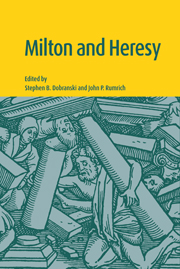Book contents
- Frontmatter
- Contents
- List of contributors
- Acknowledgments
- Abbreviations
- Introduction: Heretical Milton
- PART I HERETICAL THEOLOGY
- PART II HERESY AND CONSEQUENCES
- PART III HERESY AND COMMUNITY
- 7 Licensing Milton's heresy
- 8 Milton and the rationale of insulting
- 9 Treason against God and state: blasphemy in Milton's culture and Paradise Lost
- 10 The politics of performance in the inner theater: Samson Agonistes as closet drama
- PART IV READERS OF HERESY
- Index
8 - Milton and the rationale of insulting
Published online by Cambridge University Press: 10 October 2009
- Frontmatter
- Contents
- List of contributors
- Acknowledgments
- Abbreviations
- Introduction: Heretical Milton
- PART I HERETICAL THEOLOGY
- PART II HERESY AND CONSEQUENCES
- PART III HERESY AND COMMUNITY
- 7 Licensing Milton's heresy
- 8 Milton and the rationale of insulting
- 9 Treason against God and state: blasphemy in Milton's culture and Paradise Lost
- 10 The politics of performance in the inner theater: Samson Agonistes as closet drama
- PART IV READERS OF HERESY
- Index
Summary
Most writers on Milton's political prose sidestep its voluminous insults. Some Milton scholars deplore them because they are not only numerous but cover the entire range of mudslinging. Worse still, they suspect he enjoyed it. Others simply ignore the insulting, as unworthy of the poet or of their own attention. Historians, though very interested these days in Milton's radical politics or heretical dogmatics, nonetheless speed past the insults as subordinate to the deeds and agents of those lively years, 1642–60. Here, therefore, I call attention to his gems of vituperation, because they show us a side of Milton that we tend to ignore. In his insults, their humor and their offensiveness alike, he is making deliberate stylistic choices and revealing his character as a rhetor. Applying to his occasions of insulting the resources of his reading and his vivid imagination, he shows himself hairetikos in the primary sense: the Greek word first meant “able to choose.”
Particularly in the Latin of the First Defence (1651) Milton chooses to present a humanist self to European readers. In an authentically classical manner, he persuades not only through his argument but also by giving pleasure, the peculiar pleasure that pertains to adept insult and its mingling of delight and instruction. This is not to imply that only then, in 1651, did he vituperate in public. He uncovers a lively vein of abusive satire in the university prolusions and his antiprelatical tracts. He unleashes choice Anglo-Saxon phrases, often involving derogatory animal imagery, in Colasterion and other English polemics of the 1640s. Insults also figure in memorable episodes of Paradise Lost and Samson Agonistes.
- Type
- Chapter
- Information
- Milton and Heresy , pp. 159 - 175Publisher: Cambridge University PressPrint publication year: 1998
- 2
- Cited by

